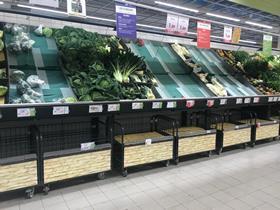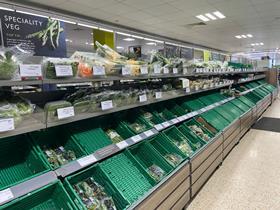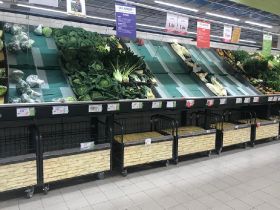

Empty shelves, probably the one thing that retail merchandisers fear the most, have been all too evident in the UK’s supermarkets over the past week as concern over the coronavirus outbreak prompted British shoppers to fill their trolleys with an unprecedented volume of groceries. But how much is panic buying to blame for recent shortages, and how big a problem is it likely to be in the coming weeks?
Despite many in the UK bemoaning a very un-British lack of reserve, the same thing did also occur in Italy at the end of February, when people in the north of the country descended on their local supermarkets in huge number, entirely clearing stocks of essentials including olive oil and pasta. Speaking at the time, one fresh produce professional said the situation was the result of “collective psychosis”, whipped up by the media following the government’s decision to restrict access in and out of 11 areas affected by the virus.
Since then, however, Italian supply levels have returned to somewhere approaching normal, helped in some instances by wholesalers diverting fruit and veg no longer needed by customers in the restaurant and catering business. The hope is that a similar levelling out of supply will also occur in the UK during the coming weeks. On Friday, the Fresh Produce Journal revealed that the creators of FruPro, an app designed to connect fresh produce buyers and sellers, was working to link up suppliers with customers as both groups tried to adjust to the new market reality.
So what is to blame for this dramatic episode of panic buying? Unsurprisingly, the mainstream media jumped to a quick conclusion, pinning the blame on a horde of selfish shoppers with a complete lack of regard for others – especially key workers in the National Health Service – that also need food and other essential provisions.
Yet is it wholly accurate to blame a distinct group of hyperactive panic buyers for stripping the shelves bare? Or is this unfortunate trend in fact the result of more modest purchasing behaviour across a far larger swathe of the population?
Kantar Worldpanel managing director Chris Morley, writing on LinkedIn, said research conducted primarily by his colleague Andrew Walker suggested the sight of some shoppers piling industrial volumes of toilet paper into their trolleys had obscured the real picture.
Analysing data from a representative sample of 100,000 shoppers, Kantar found that stockpilers – shoppers purchasing significantly more compared with previous visits – made up only a very small proportion (3 per cent) of all buyers.
“To our surprise, there were nowhere near enough to explain the volume of purchasing required to wipe out the aisles of many of the categories that we were seeing empty aisles for in during the first weeks of stockpiling in the UK,” Morley explained. “We found that uplifts in sales across the whole category, often as much as 160 per cent of normal levels, regularly each day, are being created by a much more understandable and less selfish behaviour by shoppers visiting these stores.”
According to national grocers’ association the British Retail Consortium, British shoppers spent an additional £1bn on food in the first three weeks of March, although some have suggested that simple figure does not represent a true picture of what’s been happening.
Writing in The Times, Sam Chambers said supermarkets had found themselves “trapped in a cycle” where restocked items were selling out “within a couple of hours”.
“Huge volumes of shoppers were adding a few extra purchases of products they normally buy and adding a few purchases of categories that they don’t often buy into their trolley or basket and were shopping more regularly than normal, across these first few weeks,” Morley continued. “This adds up to a whole lot of buying.”
Supply levels in fresh produce departments, which initially had appeared to be holding up well, were also looking very stretched during the second half of March. And while it would be wrong to say that fresh fruit and vegetables have not been selling out by the end of the day in many instances, the impact of what the Germans and Dutch refer to as ‘hamstering’ appears to have been far more acute in categories not usually on everyone’s shopping list every time they go to the supermarket – like the much-reported toilet rolls, soap dispensers and of course hand sanitiser.
“So, for categories that people buy frequently and in volume, like bread, fruit, meat, where there is a lot of inventory to go at, the shelves gradually became empty but for categories that most people don’t buy often at all, they were wiped out almost immediately,” Morley added.

Measured reaction
Despite the newspapers and rolling news channels blaming the empty shelves on panic buyers, retail analysts have been more measured in their commentary. Some have reasoned that the ultra-efficiency of modern retailers’ just-in-time supply chains, combined with the more modest, universal rise in consumer demand identified by Kantar, are more important factors than the highly emotive stockpiling phenomenon shown on rolling news channels.
“I strongly suspect there isn’t much panic buying or hoarding in the way we imagine,” said Greg Callus, not an analyst himself but a leading barrister specialising in media and communications, in a widely shared Twitter post. “This isn't anti-social idiots stockpiling canned goods: it's every household adding £5 or £6 to its weekly shop. It's happening to a highly-calibrated supply chain that can replenish daily – because there is no shortage – but just can't keep the shelves full during the day.”
Other regular retail-watchers, however, were sceptical about pinning the blame on just-in-time supply chains. “Even at Christmas peak, stores don’t get stripped bare,' said Karl McKeever, founder and MD of Visual Thinking Group. “Yes there is seasonal planning to anticipate and cope with increased sales then, but there is clear evidence of people buying more than usual, and in quantity in key categories to stock up at home.”
Steve Dresser, who provides retail consultancy services to some of the UK’s top supermarket directors, warned against “hindsight bias”, arguing that no-one could have been expected to anticipate such a radical change in the market dynamic, or indeed take it in their stride. Adapting to such a massive spike in consumer demand, he said, would have taken even the best-prepared retailers by surprise.
“So they should have held tonnes of stock in warehouses because we may get a pandemic?” he wondered. “The US holds more stock than UK stores do, they were left exposed too. How can you hold enough stock to cope with a leftfield sales rise of 70-120 per cent? Garbage.”



